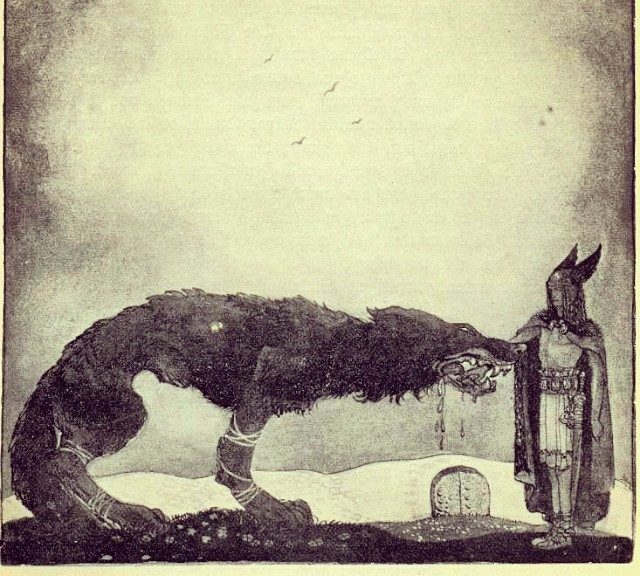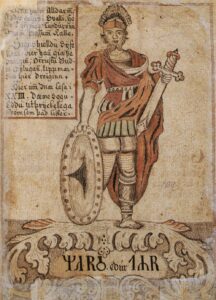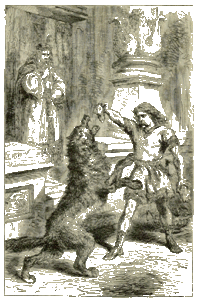
The Norse Gods: Tyr
Tyr is a Norse god who is a member of the Aesir, one of the most powerful of the gods, and the principled warriors among them. He is the namesake of the day Tuesday (Tyr’s Day) and is renowned for being the bravest of all the gods and his pursuit of justice.
Tyr is an Ancient, Powerful God

Tyr was once a significant Norse deity, although his importance has been overshadowed by gods such as Odin and Thor. Tyr is one of the oldest of the Gods, with references to him in texts dating back to the Viking age. According to Norse mythology, he is the son of Odin and Fjorgyn (Jord) or Hymir and an unknown Jotun.
Tyr’s Domain
Tyr is the god of justice, law, and technical skill. He is a protector of the people and their rights, defending the innocent from criminals. Tyr is also a god of war, leading his warriors into battle with great courage and skill. He is frequently seen depicted with one hand missing. Tyr sacrificed his hand to Fenrir to bind the wolf and prevent any further chaos.
Tyr and Fenrir

The most famous story involving Tyr is the story of Fenrir, a huge and powerful wolf who is the son of Loki and Angrboda, a Jotun. A Norn prophesized that during Ragnarok Fenrir would devour Odin and much of Midgard. To avoid this, the gods decided to chain Fenrir.
But Fenrir broke any chain the gods put on him, so the gods asked the Dwarves to make an unbreakable chain. The Dwarves created it with the sound of a cat’s footfall, the beard of women, the roots of mountains, the sinews of the bear, the breath of the fish, and the spittle of the birds. The chain, Gleipnir, was very light, but nonetheless stronger than steel.
Fenrir didn’t trust the gods when he saw Gleipnir and demanded someone put their hand in his mouth as a token of honestly that they would remove it should he not be able to break it. None of the gods were willing to do so, except Tyr.
Tyr bravely stepped forward and offered to put his right hand into Fenrir’s mouth, knowing what would happen. After the gods bound Fenrir with the chains, Fenrir could not break them. Hence, Tyr lost his right hand.
The God of Truth and Law
Tyr is a god of commitment and truth. He is a symbol of loyalty and strength, and is seen to honor his word and stand by his friends or loved ones no matter the circumstances. He has strong codes of honor, seeing no shame in admitting when he is wrong or making amends when necessary.
Tyr is a deity whom people highly respect. His followers frequently invoked in both personal and legal matters. He maintains law and order among the gods and humans. He is revered for his power and his belief in justice above all else.
Tyr is an excellent example of the Norse concept of virtue. He is a representation of strength, honor, courage, and virtue. He was willing to make sacrifices and put himself at risk in order to protect others, making him a model of courage and morality.
Did you know you can become my patron for as little as $5 a month? This entitles you to content not posted anywhere else. Plus you get to see posts like this three days before the public! Without patrons, I’d be having a very hard time keeping this blog going. Become a patron today!Become a Patron!





2 thoughts on “The Norse Gods: Tyr”
Hi,
more than a comment I have a question.
As I’ve found in varios version of the story, Tyr and Fenrir were friends.
Tyr is the god of justice and law, and ofthen called as witness in oath.
I have problem understanding how reconcile this with the coscient fraud of Fenrir, when Tyr gave His word to free the Wolf, well knowing that the pact will not be respected.
You’re right. There is an inconsistency when it comes to Tyr and Fenrir’s relationship. I will try to explain it as the god explained it to me. Tyr raised Fenrir from a puppy, that much is certain, because he took care of Fenrir as he grew.
Odin received knowledge that Fenrir would not only swallow him, but a good portion of Midgard. Tyr received the news with dread because although he and Fenrir were opposites (Law and Chaos), neither could exist without the other. So, when it came time to bind Fenrir, Tyr sacrificed his hand, (or if you believe in symbolism, some of his power), to bind chaos for a time. Yes, he made an oath and paid dearly for breaking it. He did not want to bind the wolf, but he knew if he didn’t Fenrir would bring Ragnarok early to our world.
I get the feeling of sadness when I talk to Tyr about it. He did not want to bind Fenrir, but the prophecy gave him no choice and there was no way Fenrir would’ve accepted Gleipnir otherwise.
I realize a lot of what I say is UPG or Unverified Personal Gnosis, but I hope it clarifies why it happened.